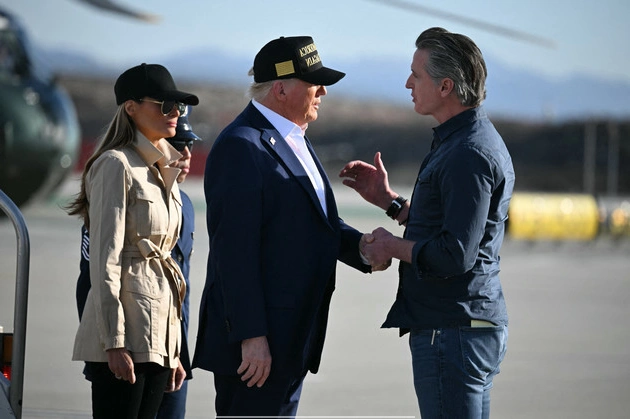
The Trump administration is urging a federal judge to reject California Gov. Gavin Newsom’s bid to block the military from supporting immigration enforcement activities in Los Angeles, calling the lawsuit a “crass political stunt” and warning that the restraining order Newsom wants would endanger federal personnel.
Legal Battle Over National Guard Deployment
In a pointed, 32-page filing replete with political overtones, the administration contended that Trump’s decision to deploy the military to help suppress unrest — stemming from ICE raids and arrests taking place across Los Angeles — is entirely within his authority as commander-in-chief, and unreviewable by the court.
Breyer, a Clinton appointee, is set to hold a hearing Thursday afternoon on Newsom’s request. The governor initially asked the court to block the deployment within two hours, but the judge agreed to a Justice Department request for 24 hours to respond.
Trump has authorized the Pentagon to call up nearly 4,000 members of California’s National Guard contingent on a mission to protect Immigration and Customs Enforcement facilities and personnel. Defense Secretary Pete Hegseth has also deployed 700 Marines to Los Angeles.
Constitutional Concerns and Legal Justifications
Though federal law generally bars the use of the military to enforce domestic laws, Trump invoked a provision that permits him to call up National Guard troops to protect federal property and personnel when there is a “rebellion” or “danger of rebellion.”
The Justice Department described the chaotic situation on the ground over the weekend as “mobs resisting federal authority in a manner that rises to the level of rebellion,” although city and state officials have emphasized that the unrest has impacted only a few relatively small parts of the sprawling metropolis.
DOJ lawyers also urged Breyer not to second-guess the president’s assessment that military support was needed. Newsom’s claim that the law required Trump to consult him before issuing such an order is both wrong and dangerous, DOJ lawyers argued, because it would give state officials an effective veto of the president’s military judgment.
Clarifications on Military Support
DOJ attorneys also dismissed as speculative the state’s concern that the National Guard or military forces would take part in law enforcement. Images taken on the streets of Los Angeles Tuesday showed Guard forces standing watch as immigration enforcement officers detained and searched potential deportees.
The administration argued that those troops were there to protect ICE officials, a distinct mission from carrying out immigration arrests.
Justice Department lawyers salted their brief with a series of thinly-veiled political shots at Newsom, speculating that California officials might be “unwilling” to put a stop to the violence.
Legal Precedents and Political Comparisons
The DOJ brief also draws an analogy sure to grate on Newsom: comparing him to Arkansas Gov. Orval Faubus, who sought to use that state’s National Guard to resist court-ordered school desegregation in the 1950s.
The federal statute Trump invoked “affords no veto to Governor Newsom over the President’s decision to call forth the guard, just as it afforded no veto to Governor Faubus when President Eisenhower last invoked the predecessor [statute] to ensure that the enforcement of federal law was not obstructed,” DOJ lawyers wrote.











